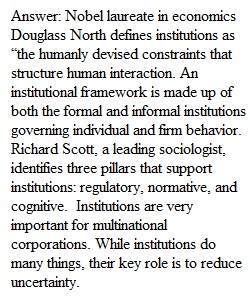


Q MAN 6607 Global Organizational Issues (Online MBA) Prof. Rottig Case Analysis Instructions A case analysis is a response to case guide questions for each case assigned over the course of the term. A case analysis should be one to two pages, typed, single-line spacing, Times New Roman 12-pitch font with 1-inch margin all around. Case analyses are due by 11:59pm (EST) on the Sunday of each week in which a case is assigned. Late submissions will not be accepted and result in a grade of 0 (zero) for the respective case analysis. You will receive full credit if you a) submit the case analysis on time and b) make a serious effort to answer the questions within the aforementioned space limitation (note: case analyses that are less than one page or over two pages, as well as analyses that do not answer every question will not receive any credit). Please make sure to include your name, case title, course title and date on top of the case analysis and repeat each question in the body of the text, in bold letters, to clearly indicate which answer belongs to which question. Case analyses consist of individual work - each student is expected to write his/her own analyses. Case Questions Case: “Carlsberg Confronts Political Risk in Russia” 1. What are institutions and why are they important for multinational corporations? What are formal institutions? 2. What is political risk? Would you consider foreign direct investments in Russia politically risky? Why or why not? 3. If you were a Carlsberg board member, would you vote “yes” or “no” for a new project to acquire a local brewery in Russia? Explain why. Important Note: Case briefs must be submitted as a file attachment in WORD format via Canvas. Do NOT submit your case using a text submission. Text submissions will not be accepted for grading. Make sure to follow the aforementioned formatting instructions and length restrictions for the case analysis before submitting it.
View Related Questions